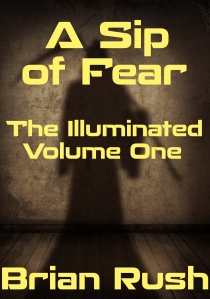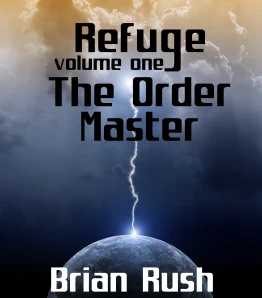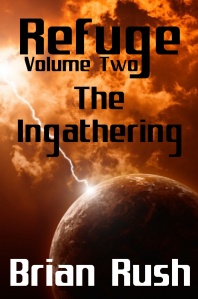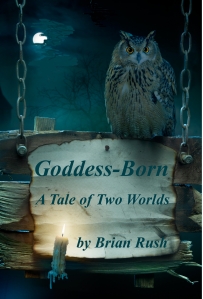 This is the third post in the series in which I explore the philosophical side of my fiction. This post concentrates on the third series I’ve begun, Refuge.
This is the third post in the series in which I explore the philosophical side of my fiction. This post concentrates on the third series I’ve begun, Refuge.
The framework of Refuge came to me out of the blue one day when I wrote a mini-story set on the Andol home world. It was doomsday. The Droon had launched their annihilation attack and the Andol had retaliated. The character who would become Amanda Johnson was shown talking to her rather frivolous and irresponsible younger brother, who became Lionel Horne, about the Refuge program that would let a few of them reincarnate in the bodies of an alien species after they all died. The scene shifted to medieval England, where Amanda-to-be had been reborn in human form, met a man her father was considering for her husband, and discovered to her shock and consternation that he was a Droon (who would become John Stevens). The final scene of the mini-story was proto-Amanda’s discovery of her erstwhile fiance’s corpse, revealing the presence of the Scourge of God.
This mini-story hasn’t been published and I have no plans to publish it, but that’s how I first outlined the idea of the two alien races reincarnated as humans, and of the Scourge of God, a religious organization dedicated to murdering one of them (believing them to be demons, which was wrong but not that far off). I decided instead to start the story in modern times, and to make the hereditary Order Master of the Scourge of God the main character of the series’ first volume, called The Order Master.
Refuge
Two volumes of the Refuge series, The Order Master and The Ingathering, are complete and published. A third volume, The Rapier, is roughly half-finished in its first draft. The books include lots of combat, some romance, a bit of not-too-explicit sex, magical visions, sneaky plots, torture, and a smuggled nuclear explosive, but as with the other posts in this group that’s not the part I want to talk about.
The contrast and conflict between the Droon and the Andol involves the idea that a species with advanced technology may “mature” — achieve a sustainable society — in a couple of different way. As the Andol artist William Dillinger explains to Claire in The Ingathering:
“A mature intelligent species has a unified planetary government, doesn’t fight wars anymore, and has a sustainable relationship with nature. It’s in no danger of destroying itself either in war or by exhausting the planet’s resources. That puts it in a position to explore the nearby stars, especially since it usually discovers faster than light travel about the same time. . . But you lay those things out in front of most people, and they’ll think ‘utopia.’ That’s not always true. The Droon prove it. They had a unified government, didn’t fight wars anymore, and had a sustainable relationship with nature, and yet they also had a master class that turned all the rest of their people into slaves. That’s one way a species can mature. The master class imposed harsh rule, stamped out all the Droon warlike tendencies, and forced their society to go green.”
“So they’re the way they are because they had to be to survive?”
“Could be. We matured differently, though, so that’s certainly not a universal rule.”
“How did you get there?”
“We had a global economy, planetary government was set up to regulate it, and then a democratic movement took it over. We came to our senses collectively. It meant we were a lot less polarized than the Droon. We had no master class in the end, but we could have gone the same way as the Droon, if the democracy movement had failed. And then if our rich elite had seen the need for peace and environmentalism instead of just pushing everything over the cliff. That’s what happens with a lot of species, actually. They die.”
As a result of this different history, the two species are radically different in character, and present the two poles of our possible future as a species: light and dark, good and evil, free and egalitarian or hideously enslaved. This theme runs through all three books and should continue through the last two of the projected five (with tentative titles of The Hive Mother and The Andol Queen.
The Order Master also deals with questions of religious orthodoxy, religious freedom, and the danger of fanaticism, because of the central position of the Scourge of God in the story. Michael Cambridge’s flashbacks to his father and his forced assumption of the leadership of the Scourge show this in a chilling way.
“Michael Cambridge,” said Jeffrey Tanner, a solidly-built man of forty-five, and no friend to Mike or his father. “Michael Cambridge, you have been brought here to face judgment. The Council of Chapter Masters met shortly after your flight to America. You were charged then with heresy, apostasy, and attempting to leave the order.”
“I was never in the order, damn you!”
“Unlike the rest of us, Mike, you were born in the order,” said Reggie Dougherty, a man Mike thought more sympathetic. “And besides, if you aren’t in the Scourge, we cannot let you live, knowing what you know.”
“Judgment was passed in Council,” Tanner said. “The charges of heresy and apostasy were dropped for lack of evidence. Your behavior was examined, and the Council convicted you of attempting to leave the order, an action carrying a penalty of death.”
“Why am I still alive, then?”
“Because the Council couldn’t bring itself to order the death of Osgood’s heir without giving him a chance at redemption,” said Leslie Grumble, an old man and normally a level-headed one. “Your death sentence was suspended until you turned thirty years old and became eligible to assume your place as Order Master. The Council also ruled that at that time, you be given a choice.”
“You may take your inheritance, Michael Cambridge, only son of James Cambridge, heir in right lineage to Osgood of Cambridge who founded the Scourge of God,” said Steve Marshall, another friendly face, or so Mike would have thought. He did not look particularly friendly at the moment. “You may become the Order Master of the Scourge of God and lead us in our struggle to preserve Christendom against the assaults of Hell. If you do so, all the charges will be dismissed and it will be as if they were never leveled.”
“And if I say no?”
Steve sighed and nodded to the fifth man, who had a hood pulled down over his face. He threw it back now and Mike saw the grim face of John Carpenter, the order’s Chief Justicar. John pulled a bottle from his robe and set it down on a table.
“Poison,” Mike said.
“Yes,” said Reggie. “A painless, lethal dose of barbiturates and narcotics. We have no wish to see you suffer, Mike. But you must make a choice. Either the Scourge of God is your destiny, or that is.” He nodded at the bottle on the table.
The Ingathering goes more deeply into the contrast between Droon and Andol and the significance of that conflict for our future as a species. It also includes some thoughts about the quest for enlightenment and whether it’s compatible with the use of magical power (or indeed, any power) for practical purpose. Finally, The Ingathering introduces the character of Inez Marcos, the Lady of the Droon (or the Hive Mother, as the Andol call her), whose philosophy comes out when Stevens approaches her for permission to attack the Birds’ Nest:
“Above all else, we strive to prevent the birth of God.”
“The what?”
“God is not yet real, Stevens. Not in the present moment, but It exists in potential. Every planet, every species that matures in the form that the Andol did, brings God a little closer to manifesting in the here and now, and as long as that remains possible, God will be a virtual presence, Its power reaching back in time from that possible future to midwife Its own birth. If that critical mass of mature minds is ever reached, if God becomes real in the present moment and not just in potential, then the return of Sacred Night will never happen, and the mistake of existence will never be rectified. Endless ages of splintered reality, unending eons of suffering, imperfection, unwholeness. That is what we seek to prevent. That is what service to Sacred Night means. That’s why the Droon matured in the form we did. Do you think this is a viable way of life? Nonsense. We stifled the potential of almost all of our people, and that was the point. The exaltation of what we arrogantly call the ‘True Droon’ was an unavoidable side-effect. The real point of it was to shove almost all Droon into the muck of despair, while poisoning the fortunate few with malice and cruelty and their own lust for power. In that way none of the Droon can reach their real potential, and we are on a collision course with our own doom.” She smiled again. “In this way we serve Sacred Night. We sacrifice ourselves, and you fools don’t even see that you are spread out on the altar and under the knife every bit as much as the hapless humans you torment for your twisted pleasure.” She laughed. “All to prevent the birth of God.”
Stevens swallowed, tight-lipped. Inez Marcos was right about one thing. He felt certain she was crazy as a bedbug.
The work in progress, The Rapier, further develops that last theme.
“You Andol believe in an intelligent, conscious universe, and that’s the focus of the Andol religion. Am I right?”
“To the extent we have a religion.”
Inez waved this away. “You do, it’s just more sophisticated than the crude human beliefs that go by that name. But here’s how I see things. The universe encompasses all of time as well as space, and it is one only at the beginning and the end. Between those two, it’s many. You see the unity of the cosmos as a creative force, and that means, in my understanding, that you are tuning in to the beginning of the universe, what the human scientists quaintly call the ‘big bang.’ But the universe is one at the other pole, too, the end of time, the final silence, stillness, and dark. And that other end of things is not a creative force at all.”
Amanda frowned. “Obviously what you’re saying is true, and it’s not a new idea for me. But it makes better sense as I see it to tune in to that creative side. The other end of things may be just as sacred, but it’s best respected from a distance.”
“And therein lies all the misery we endure. Clinging to life, we suffer unending pain. That was the Buddha’s insight, his First Noble Truth, but I saw it a long time before he did.”
Amanda smiled. “I suspect he achieved his illumination independently.”
Inez laughed. “Since he lived and died long before we alien creatures arrived on this planet, that’s fairly safe to say. Still, I believe he was right. Life is suffering, and desire for life binds us to it and perpetuates suffering. The end of all things, which I call Sacred Night, brings peace and a return to the unity from which we came, ending the great mistake that is this divided and fractious world we inhabit.”
These themes wind their way through the stories. As with the other series, there’s no shortage of action in Refuge, but there are also many passages like these. If you encountered something like this in a work of fiction, would you be intrigued, or would you want to skip it to get to the “good parts”? Answer that question, and you’ll know whether these stories would interest you.
Next week: The Illuminated.
 This is the fourth and last installment in which I engage in navel-gazing. (Ahem.) In which I explore the fact that I can’t write fiction that’s just escape.
This is the fourth and last installment in which I engage in navel-gazing. (Ahem.) In which I explore the fact that I can’t write fiction that’s just escape.






